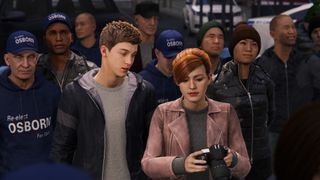Our Verdict
Insomniac's Spider-Man is as loveable as ever, even if the surrounding game can't quite live up to him.
PC Gamer's got your back
What is it? A fantastic superhero simulator in an underwhelming open-world.
Expect to pay: £50/$60
Release date: August 12
Developer: Insomniac Games/Nixxes Software
Publisher: Sony
Reviewed on: AMD Ryzen 5 3600, Nvidia GeForce 2080 Super, 32 GB RAM,
Multiplayer: No
Link: Official site
I was convinced that I'd struggle to play Marvel's Spider-Man Remastered with a keyboard and mouse. The thrilling web-swinging and complex slugfests of Insomniac's open-world Spidey game feel so specifically tailored to a PlayStation controller that I couldn't imagine how anyone could feasibly translate it to the PC's traditional control scheme. Yet not only is Spider-Man Remastered perfectly playable on keyboard and mouse, in some ways it's superior to the PS4 experience.
Swinging through the New York skyline was always the best bit of Insomniac's title – with the Ratchet & Clank studio delivering possibly the best movement system in any game of the last decade. Traversing Manhattan as Spidey is equally enjoyable on PC, only now you press and hold left-shift to start and maintain a swing, interspersed with deft taps of the spacebar to add little bursts of straight-line speed. But it's the addition of mouse control that really gives the PC version an edge, letting you slip through tiny gaps between tenements and skyscrapers in a much smoother fashion than with a pad. Spidey's web-swinging was designed to make you feel like an experienced superhero in his element, and the mouse makes inhabiting this fantasy that much easier.

Combat, too, is surprisingly at home on keyboard and mouse, considering how involved Spidey's fighting style is. Basic attacks are assigned to the left mouse button, and you can launch enemies into the air by holding the button down. Almost everything else is assigned within easy reach of your left hand, from webbing-up enemies with rapid taps of the E key, to deploying special abilities like healing and combat finishers with the first few number keys. The only notable console hangover is that Spidey's web abilities are chosen from a selection wheel brought up by holding down middle-mouse. But not only does using this quickly become intuitive, the fact that it pauses the action also allows a moment to figure out your next move. It’s also worth noting that, as you’d expect, the controls can be completely rebound, so if there’s something you don’t like about Nixxes' control scheme, you can change it.
Spidey-sense
Nonetheless, the control adaptation is undoubtedly the most impressive element of Nixxes' port. In presentation, sadly, Spider-Man Remastered is not quite so masterful. The game undoubtedly benefits from unlocked framerates, while the addition of DLSS lets you whack that sucker up to 4k and maintain a blissfully smooth experience. But there are some ongoing issues with the game's ray-traced reflections, which look rather fuzzy in the game's many puddles and glass windows. A last-minute patch has gone some way to fixing the issue, however, improving the performance and visual quality of both ray-tracing DLSS. When you're swooping through Time Square at speed, it looks great, but if you stop and pay attention, you can see that reflections off surfaces like vehicle bodywork just don't look right.
It's also worth noting the patch adds support for three different AI upscaling methods. DLSS was already in the game, but the patch also adds preliminary support for AMD FSR 2.0, and enables you to select Insomniac's homebrew upscaling solution, IGTI. Of the three, DLSS is the only one where the impact on image quality is negligible. Both AMD FSR and IGTI make surface edges appear fuzzy , though the FSR support is still very much a work-in-progress.

While generally decent, the PC port isn't quite a slam-dunk. The same can largely be said for the game itself. Spider-Man is a five-star character in a three-star world. Peter Parker is arguably the perfect video-game protagonist – incredibly likeable and empathetic, powerful but not invincible, and equipped with a traversal system so good it makes you want to explore every nook and cranny of Manhattan.
It's important to stress just how good the web-slinging is.
It's important to stress just how good the web-slinging is, and how much the broader game relies on it to hold your attention. It's not just the way the game encourages you to maximise every swing, arcing through the air, backflipping at the zenith, then plummeting toward the ground before hitting left shift at the last possible moment. It's how Insomniac caters for every possible way you might want to move Spidey around the world. Not only can you crawl up walls, you can sprint up and along them, and seamlessly leap from them into a swing. Run up to the corner of a building and Spidey will automatically fire out a web to swing himself around it, like you might swing yourself around a lamp-post to turn the corner of a street. There's even a specific animation for running up the side of one of New York's iconic fire-escapes, which blows my mind every time I see it.
It's some of the most incredible animation work you'll ever see in a videogame, and it all contributes to the pure wish-fulfilment of Spider-Man's initial hours. The opening sequence, which sees you battling through the headquarters of Wilson Fisk (aka Kingpin), is a spellbinding statement of intent, both a stunning extended set-piece and an impressively comprehensive tutorial. Afterward, the game gives you space to enjoy the fantasy of being a friendly neighbourhood Spider-Man, zipping around the city, foiling muggings and robberies, halting car-chases, and enjoying the adulation of your fans.

As the game opens up, however, it quickly becomes apparent that Insomniac doesn't really know how to fill-out the open world. Many of the game's side-quests devolve into simplistic icon chasing, collecting backpacks, chasing pigeons, playing hide-and-seek minigames with Black Cat. Even the more action-packed optional stuff, the small-scale crimes and larger, more challenging base fights where you fend off waves of enemies, do little to elaborate upon their basic premises.
Spider-Man's biggest shortcoming is its failure to effectively utilise the comics' wonderful roster of villains. Spider-Man probably has the most memorable collection of foes outside of Batman. But unlike the Arkham games, which use Batman's enemies to great effect in the open world, Spider-Man's adversaries barely get a look in until the third act. An early chase sequence with Shocker demonstrates the potential for knockabout open-world fun. But even this is contained to the main story, and you don't see many other notable Spidey villains until toward the end of the game.
Instead, most missions involve fighting one of three different factions of armed thugs. This isn't a problem in the early game, but if you thought Arkham Knight stretched Rocksteady's combat system to breaking point, Spider-Man's fisticuffs hang by a thread after twenty-five hours. It's impressive in a way, because the system isn't exactly short of methods to dispatch these hired goons, but it feels completely exhausted by the time you approach the final act.

In short, Spider-Man's open world design is a missed opportunity. But this isn't necessarily a deal-breaker. Simply being Spider-Man is an awful lot of fun, and while Insomniac's attempt at open-world design is lacking, the studio's approach to storytelling is excellent.
Older, wiser
Indeed, Insomniac does a better job of telling a Spider-Man story than anything in the MCU, using the additional scope offered by a videogame to add some proper depth to both Spidey and the secondary cast. The decision to go with a slightly older Peter Parker is a smart one, and not simply because it means Spider-Man Remastered isn't another origin story. It lets Insomniac explore already-matured relationships between these well-known characters.
The existing history between Peter and Mary Jane, for example, makes for a far more interesting relationship than yet another teen romance. It also leads to some wonderful scenes, like their first post-breakup rendezvous in a New York cafeteria (which includes a lovely Stan Lee cameo). The game also neatly knits an origin story into the overarching plot, establishing the relationship between Peter and Miles Morales, and setting up the younger Spidey for his own adventure, which is coming to PC a little later this year. But the highlight of the game's character drama is the relationship between Peter and Otto Octavius. The game spends a lot of time establishing not only their friendship, but their mutual intellectual respect. This makes Otto's slow descent into villainy all the more tragic and effective, even though we know where his character ultimately goes.

This isn't to say that Insomniac's Spider-Man is a po-faced affair. Spidey is as quippy as ever during fights, and the script is laced with fun jokes, such as an amusing running Spider-cop gag. (As an aside, Spider-Man's portrayal of the NYPD is very favourable, which can be jarring given the seemingly endless controversies involving US police forces, and the broader debate about law enforcement practices). But the writing is equally capable in the quieter and more serious moments. You genuinely feel for Peter as he desperately tries to hold the city together while his own life falls apart, and although the game doesn't do enough with Spidey's enemy roster, the two villains it focuses on the most are both superbly portrayed antagonists.
The story is not without its flaws either, however. The second act is too drawn out, and the third too short. The playable Mary Jane sequences help lend the character greater agency, but Spider-Man isn't a great stealth game even when you're Spidey. As Mary Jane, they become cramped, insta-fail stealth puzzles with poor signposting, and are easily the most frustrating sections in the game.
But even when this game is at its most irritating, there is still something irresistibly likeable about it. Marvel's Spider-Man Remastered may not be as well-rounded an experience as Rocksteady's Arkham games, certainly City and possibly Knight too. But when you're swinging through Time Square in glorious sunshine as New York's citizenry gazes agog at you from below, well, it's a superhero high that even the Caped Crusader would struggle to beat.
Insomniac's Spider-Man is as loveable as ever, even if the surrounding game can't quite live up to him.

